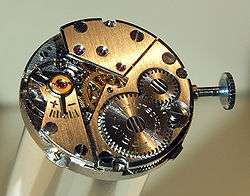Compatibilism
Compatibilism is the belief that free will and determinism are mutually compatible and that it is possible to believe in both without being logically inconsistent.[1]
Compatibilists believe freedom can be present or absent in situations for reasons that have nothing to do with metaphysics.[2] They say causal determinism does not exclude the truth of possible future outcomes.[3]
Similarly, political liberty is a non-metaphysical concept.[4] Statements of political liberty, such as the United States Bill of Rights, assume moral liberty: the ability to choose to do otherwise than one does.[5]
History
Compatibilism was championed by the ancient Stoics[6] and some medieval scholastics (such as Thomas Aquinas). More specifically, scholastics like Thomas Aquinas and later Thomists (such as Domingo Báñez) are often interpreted as holding that a human action can be free even though the agent in some strong sense could not do otherwise than he did. Whereas Aquinas is often interpreted to maintain rational compatibilism (i.e., an action can be determined by rational cognition and yet free), later Thomists such as Báñez develop a sophisticated theory of theological determinism, according to which actions of free agents, despite being free, are, on a higher level, determined by infallible divine decrees manifested in the form of "physical premotion" (praemotio physica), a deterministic intervention of God into the will of a free agent required to reduce the will from potency to act. A strong incompatibilist view of freedom was, on the other hand, developed in the Franciscan tradition, especially by Duns Scotus, and later upheld and further developed by Jesuits, esp. Luis de Molina and Francisco Suárez. In the early-modern era, compatibilism was maintained by Enlightenment philosophers (such as David Hume and Thomas Hobbes).[7]
During the 20th century, compatibilists presented novel arguments that differed from the classical arguments of Hume, Hobbes, and John Stuart Mill.[8] Importantly, Harry Frankfurt popularized what are now known as Frankfurt counterexamples to argue against incompatibilism,[9] and developed a positive account of compatibilist free will based on higher-order volitions.[10] Other "new compatibilists" include Gary Watson, Susan R. Wolf, P. F. Strawson, and R. Jay Wallace.[11] Contemporary compatibilists range from the philosopher and cognitive scientist Daniel Dennett, particularly in his works Elbow Room (1984) and Freedom Evolves (2003), to the existentialist philosopher Frithjof Bergmann. Perhaps the most renowned contemporary defender of compatibilism is John Martin Fischer.
Defining free will
Compatibilists often define an instance of "free will" as one in which the agent had freedom to act according to their own motivation. That is, the agent was not coerced or restrained. Arthur Schopenhauer famously said, "Man can do what he wills but he cannot will what he wills."[12] In other words, although an agent may often be free to act according to a motive, the nature of that motive is determined. This definition of free will does not rely on the truth or falsity of causal determinism.[2] This view also makes free will close to autonomy, the ability to live according to one's own rules, as opposed to being submitted to external domination.
Alternatives as imaginary

Some compatibilists will hold both causal determinism (all effects have causes) and logical determinism (the future is already determined) to be true. Thus statements about the future (e.g., "it will rain tomorrow") are either true or false when spoken today. This compatibilist free will should not be understood as some kind of ability to have actually chosen differently in an identical situation. A compatibilist can believe that a person can choose between many choices, but the choice is always determined by external factors.[13] If the compatibilist says "I may visit tomorrow, or I may not", he is saying that he does not know what he will choose—if he will choose to follow the subconscious urge to go or not.
Non-naturalism
Alternatives to strictly naturalist physics, such as mind–body dualism positing a mind or soul existing apart from one's body while perceiving, thinking, choosing freely, and as a result acting independently on the body, include both traditional religious metaphysics and less common newer compatibilist concepts.[14] Also consistent with both autonomy and Darwinism,[15] they allow for free personal agency based on practical reasons within the laws of physics.[16] While less popular among 21st century philosophers, non-naturalist compatibilism is present in most if not almost all religions.[17]
Criticism

A prominent criticism of compatibilism is Peter van Inwagen's consequence argument.
Critics of compatibilism often focus on the definition(s) of free will: incompatibilists may agree that the compatibilists are showing something to be compatible with determinism, but they think that this something ought not to be called "free will". Incompatibilists might accept the "freedom to act" as a necessary criterion for free will, but doubt that it is sufficient. Basically, they demand more of "free will". The incompatibilists believe free will refers to genuine (e.g., absolute, ultimate) alternate possibilities for beliefs, desires, or actions, rather than merely counterfactual ones.
Compatibilism is sometimes called soft determinism (William James's term) pejoratively.[18] James accused them of creating a "quagmire of evasion" by stealing the name of freedom to mask their underlying determinism.[18] Immanuel Kant called it a "wretched subterfuge" and "word jugglery".[19] Kant's argument turns on the view that, while all empirical phenomena must result from determining causes, human thought introduces something seemingly not found elsewhere in nature—the ability to conceive of the world in terms of how it ought to be, or how it might otherwise be. For Kant, subjective reasoning is necessarily distinct from how the world is empirically. Because of its capacity to distinguish is from ought, reasoning can 'spontaneously' originate new events without being itself determined by what already exists.[20] It is on this basis that Kant argues against a version of compatibilism in which, for instance, the actions of the criminal are comprehended as a blend of determining forces and free choice, which Kant regards as misusing the word "free". Kant proposes that taking the compatibilist view involves denying the distinctly subjective capacity to re-think an intended course of action in terms of what ought to happen.[19]
Ted Honderich explains his view that the mistake of compatibilism is to assert that nothing changes as a consequence of determinism, when clearly we have lost the life-hope of origination.[21]
References
- Coates, D. Justin; McKenna, Michael (February 25, 2015). "Compatibilism". Stanford Encyclopedia of Philosophy. Retrieved May 10, 2016.
- Podgorski, Daniel (October 16, 2015). "Free Will Twice Defined: On the Linguistic Conflict of Compatibilism and Incompatibilism". The Gemsbok. Retrieved March 7, 2016.
- McKenna, Michael and Coates, D. Justin, "Compatibilism", The Stanford Encyclopedia of Philosophy (Winter 2019 Edition), Edward N. Zalta (ed.), forthcoming URL = <https://plato.stanford.edu/archives/win2019/entries/compatibilism/>.
- Locke, John (1690). The Second Treatise of Civil Government.
- The Monist, Vol. 70, No. 4, Thomas Reid and His Contemporaries (OCTOBER 1987), pp. 442-452 Published by: Oxford University Press Stable URL: https://www.jstor.org/stable/27903049 Accessed: 06-12-2019 22:28 UTC
- Ricardo Salles, "Compatibilism: Stoic and modern." Archiv für Geschichte der Philosophie 83.1 (2001): 1-23.
- Michael McKenna: Compatibilism. The Stanford Encyclopedia of Philosophy. Edward N. Zalta (ed.). 2009.
- Kane, Robert (2005). A Contemporary Introduction to Free Will. Oxford University Press. p. 93. ISBN 978-0-19-514970-8.
- Kane 2005, p. 83
- Kane 2005, p. 94
- Kane 2005, pp. 98, 101, 107, 109.
- Schopenhauer, Arthur (1945). "On the Freedom of the Will". The Philosophy of American History: The Historical Field Theory. Translated by Morris Zucker. p. 531.
- Harry G. Frankfurt (1969). "Alternate Possibilities and Moral Responsibility," Journal of Philosophy 66 (3):829-39.
- Ridge, Michael (3 February 2014). "Moral Non-Naturalism". The Stanford Encyclopedia of Philosophy. Metaphysics Research Lab, Stanford University. Retrieved 3 June 2019.
- Lemos, John (2002). "Evolution and Free Will: A Defense of Darwinian Non–naturalism". Metaphilosophy. 33 (4): 468–482. doi:10.1111/1467-9973.00240. ISSN 1467-9973.
- Nida-Rümelin, Julian (1 January 2019). "The Reasons Account of Free Will A Libertarian-Compatibilist Hybrid". Archiv fuer Rechts- und Sozialphilosphie. 105 (1): 3–10. doi:10.25162/arsp-2019-0001.
- Stump, Eleonore (1996). "Libertarian Freedom and the Principle of Alternative Possibilities". In Howard-Snyder, Daniel; Jordan, Jeff (eds.). Faith, Freedom, and Rationality. Lanham, MD: Rowman and Littlefield. pp. 73–88.
- James, William. 1884 "The Dilemma of Determinism", Unitarian Review, September, 1884. Reprinted in The Will to Believe, Dover, 1956, p.149
- Kant, Immanuel 1788 (1952).The Critique of Practical Reason, in Great Books of the Western World, vol. 42, Kant, Univ. of Chicago, p. 332
- Kant, Immanuel 1781 (1949).The Critique of Pure Reason, trans. Max Mueller, p. 448
- Honderich, Ted 1988 The Consequences of Determinism, p.169
